

Climate: World at risk of hitting temperature limit soon. The rich are killing the planet. Hi, this is Simon, I am a software engineer at Datawrapper.
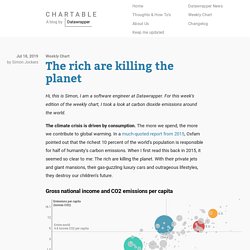
For this week’s edition of the weekly chart, I took a look at carbon dioxide emissions around the world. The climate crisis is driven by consumption. The more we spend, the more we contribute to global warming. In a much-quoted report from 2015, Oxfam pointed out that the richest 10 percent of the world’s population is responsible for half of humanity’s carbon emissions. When I first read this back in 2015, it seemed so clear to me: The rich are killing the planet. But the truth is much more inconvenient. Different ways to look at the emission curve Two weeks ago, my colleague Gregor made a series of charts that visualize the world’s ever-increasing carbon dioxide emissions: The only chart we should be looking at.
The following area chart is taken directly from Gregor’s post. As Gregor pointed out, this partly because western countries have “outsourced” their industrial production to China. Chart choices: Log or linear scales? The rich are killing the planet. Why you should go animal-free: 18 arguments for eating meat debunked. Whether you are concerned about your health, the environment or animal welfare, scientific evidence is piling up that meat-free diets are best.
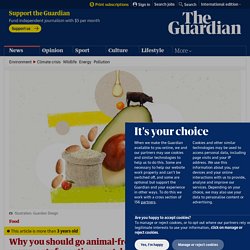
Millions of people in wealthy nations are already cutting back on animal products. Of course livestock farmers and meat lovers are unsurprisingly fighting back and it can get confusing. Are avocados really worse than beef? What about bee-massacring almond production? The coronavirus pandemic has added another ingredient to that mix. Food is also a vital part of our culture, while the affordability of food is an issue of social justice.
First, the over-consumption of meat is causing an epidemic of disease, with about $285bn spent every year around the world treating illness caused by eating red meat alone. So what about all those arguments in favour of meat-eating and against vegan diets? Meaty mattersClaim: Grass-fed beef is low carbon This is true only when compared to intensively-reared beef linked to forest destruction. There’s more. It’s not. Thawing permafrost turns Arctic from carbon sink into carbon emitter, study finds. The Arctic is home to vast swathes of permafrost which lock in large amounts of carbon and stop it from being emitted into the atmosphere and contributing to global warming.
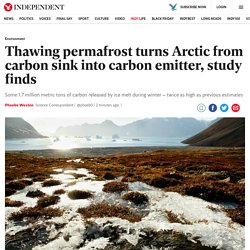
However, new research shows that a warming climate means permafrost is thawing so quickly the region is now a source – as opposed to a sink – of emissions. In summer, vegetation absorbs carbon dioxide, but this is dwarfed by the amount released during winter. We’ll tell you what’s true. You can form your own view. From 15p €0.18 $0.18 USD 0.27 a day, more exclusives, analysis and extras. Scientists estimate 1.7 million metric tons of carbon is released annually by permafrost between October through to April.
This is almost twice as high as previous estimates and far exceeds the 1 million metric tonnes of carbon sucked up during the growing season. By 2100, winter carbon dioxide emissions from the Arctic could increase by 41 per cent under a worst-case scenario, according to the paper, published in Nature Climate Change. Climate change: Big lifestyle changes are the only answer. Image copyright PA Media The UK government must tell the public small, easy changes will not be enough to tackle climate change, warn experts.
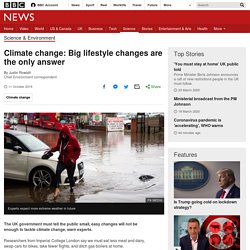
Researchers from Imperial College London say we must eat less meat and dairy, swap cars for bikes, take fewer flights, and ditch gas boilers at home. The report, seen by BBC Panorama, has been prepared for the Committee on Climate Change, which advises ministers how to cut the UK's carbon footprint. It says an upheaval in our lifestyles is the only way to meet targets. The government has passed a law obliging the country to cut carbon emissions to net zero by 2050.
It is "going further and faster than any other developed nation to protect the planet for future generations", a government spokesperson told BBC Panorama. But the new report warns major shifts in policy across huge areas of government activity are needed to keep the public onside. "Every bit of policy now needs to be refreshed," he warned in an interview with BBC Panorama.
Diet Home heating.
Shell accused of strategy risking catastrophic climate change. Royal Dutch Shell has been accused of pursuing a strategy that would lead to potentially catastrophic climate change after an internal document acknowledged a global temperature rise of 4C, twice the level considered safe for the planet.
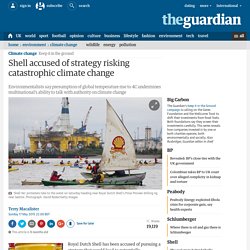
A paper used for guiding future business planning at the Anglo-Dutch multinational assumes that carbon dioxide emissions will fail to limit temperature increases to 2C, the internationally agreed threshold to prevent widespread flooding, famine and desertification. Antarctic Ice Shelf Is A Few Years From Disintegration: NASA. By Alex Dobuzinskis LOS ANGELES (Reuters) - The last intact section of one of Antarctica's mammoth ice shelves is weakening fast and will likely disintegrate completely in the next few years, contributing further to rising sea levels, according to a NASA study released on Thursday.
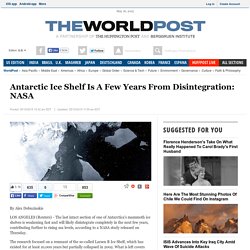
The research focused on a remnant of the so-called Larsen B Ice Shelf, which has existed for at least 10,000 years but partially collapsed in 2002. What is left covers about 625 square miles (1,600 square km), about half the size of Rhode Island.